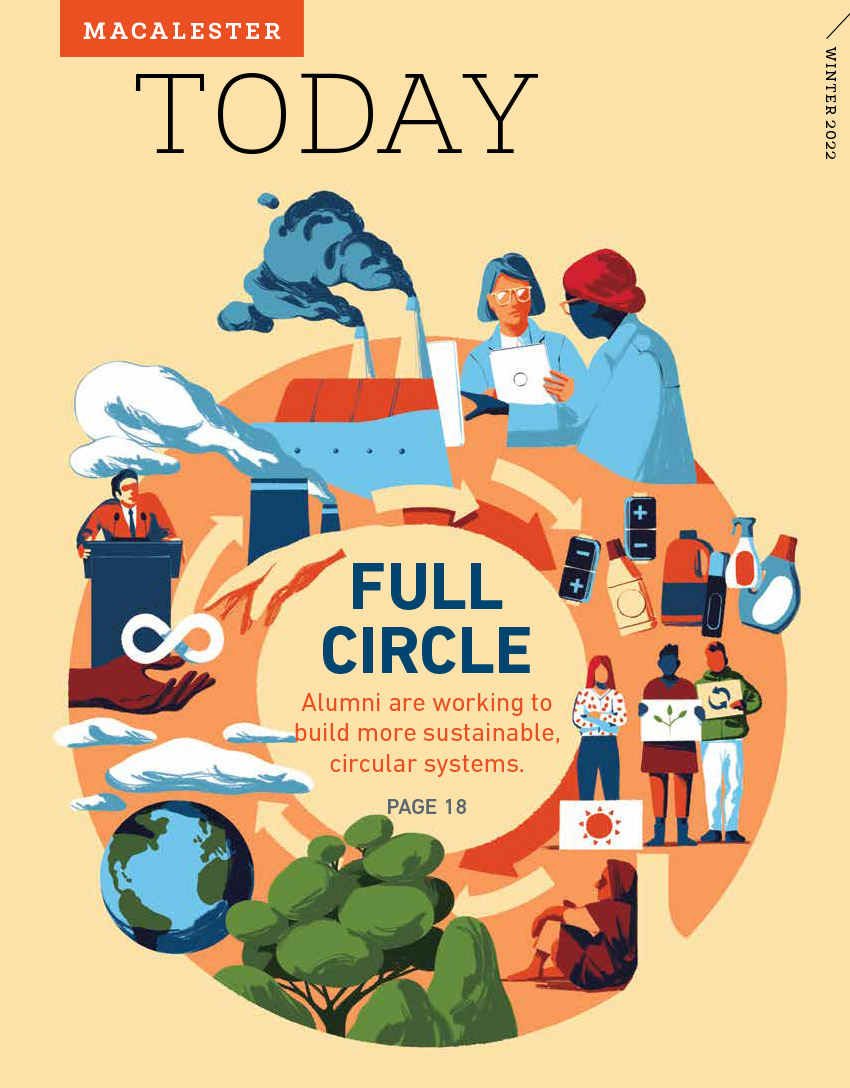
By Kate Havelin ’83 / Photo by Theresa Scarbrough
As a disaster responder, Mark Jackson ’07 has hopscotched the globe. His wanderlust and sense of urgency to help in crises have taken him from Haiti and the Philippines to East Timor and Afghanistan. Since April 2020, Jackson has focused on fighting the pandemic in Minnesota—working for Saint Paul-Ramsey County Public Health, leading COVID-19 testing and vaccination programs in Minnesota’s second most populous county.
Jackson’s scientific training and international experiences guide his approach to COVID-19’s surges and setbacks. He was born in Kenya and spent two years in Liberia while his parents served in the Peace Corps; later, his family moved to Minnetonka, Minnesota, where he graduated from high school. At Mac, he majored in biology and considered medical school but didn’t want to commit to living in one place for several years. Instead, he worked in labs, including the National Institutes of Health in Bethesda, Maryland, studying Parkinson’s disease, and in Madison, Wisconsin, studying gene sequencing in cervical cancer.
When a 7.0-magnitude earthquake slammed Haiti in 2010, Jackson left his lab work to jump into direct action. He joined actor Sean Penn’s volunteer group at a makeshift hospital. Jackson quickly realized that a medical certificate would boost his effectiveness, so he flew to Wyoming for an intensive six-week emergency medical technician training at the National Outdoor Leadership School. Then he jetted back to Port-au-Prince to oversee emergency patient transports. “That’s the thing,” he says. “Whatever needs to be done, just figure it out.”
After a few more international assignments, Jackson enrolled in a one-year graduate program at McMaster University in Ontario, Canada, earning a master’s in global health. The week before his November 2013 graduation ceremony, Typhoon Haiyan swept across the Philippines. Within hours, the Minneapolis-based American Refugee Committee called Jackson asking if he could help. The next day, Jackson and the rest of the rapid response team flew to the island nation.
He ended up working a year in the Philippines, mostly on contract with the World Health Organization. For months, he co-led a team tasked with finding, recovering, and, when possible, identifying more than six thousand typhoon victims buried in rubble and mass graves. He learned to tread carefully between rival powers—the Aquino administration and Imelda Marcos’s powerful family. “Mixing politics and health never works,” Jackson says. “We learned this right off the bat in the Philippines that anything related to politics can interfere with lifesaving work and care.”
By year’s end, Jackson was burnt out. Back in the United States, he was diagnosed with post-traumatic stress disorder. Now, when he leaves disaster assignments, he takes time to take care of himself—at a Nevada cowboy ranch, “a pretty perfect place to disconnect and unwind.”
Jackson’s next WHO assignment was in East Timor, where he and five doctors spent several months organizing a measles, rubella, and polio immunization campaign. Then, in three weeks, the team inoculated five hundred thousand children under the age of fourteen—approximately 40 percent of the population. “Women would come over the mountain on horseback with their kids to get them vaccinated,” Jackson says. “They understood they had to get their kids protected.”
When COVID-19 halted Jackson’s next planned international posting, he landed his Ramsey County job the same way he found many international postings—“All my jobs can be connected back to Mac, seemingly,” he says with a laugh. A classmate, Dr. Blair Brown ’07, called Jackson to talk about her work to create a new isolation and quarantine unit for people with COVID-19 who didn’t have a place to live. Within the week, Jackson was on the job, working with Brown to launch Ramsey County’s respite shelter for people experiencing homelessness, the first and now only program of its kind in Minnesota.
Since then, Jackson has continued to work for the city and the county, coordinating more than 20,000 COVID-19 tests in drive-through parking lot sites, the State Fair horse barn, and many other locations, often amid snow and rain. By last fall, Jackson was promoted to planning manager for a longer-term position with Saint Paul-Ramsey County Public Health and will continue as director of COVID-19 testing and vaccination support. Since January 2021, his team has administered around seventy thousand doses of vaccine at 450 clinics.
His overseas experiences contrast with the vaccine hesitancy he has encountered in the US. “Coming from an international perspective, it is almost embarrassing that we’re having to convince people to get the vaccine with enticements like lottery tickets,” says Jackson. “Overseas, you have significant barriers to getting vaccinated against COVID-19, and the line is long for that. That’s the most disturbing thing about what’s going on in the US right now. Most people in lower-income countries would kill for some of the access we take for granted to these mRNA vaccines—any vaccine against COVID.”
Jackson delayed his own COVID-19 shot to get it in front of hesitant shelter workers, a persuasive strategy he learned with WHO. He devotes much of his time talking individually to people doubtful about the vaccine. “Trust is the main currency that we need these days,” he says.
At age 37, Jackson considers his first completely full passport one of his most valuable possessions. He hasn’t plotted his next move but figures eventually he’ll do long-range disaster planning—and expects to always be open to the next call for help. “For me, it’s just instinctual,” Jackson says. “Mixing a sense of adventure with helping people: I can’t ask for anything more.”
Kate Havelin ’83 is a freelance writer in Minneapolis.
January 25 2022
Back to top





